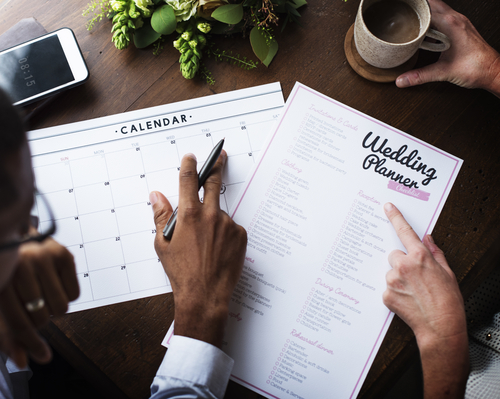Planning an LGBTQ Wedding

For members of the LGBTQ community, the decision to get married can be a lot more complicated than for straight couples. Since legal recognition of same-sex unions has only been legal in places like the United States for a few years, gay and lesbian couples do not have centuries of traditions they can draw upon for inspiration. Though all love is the same at its core, the way people express that love can vary greatly. The wedding rituals that work for a heterosexual couple may not make sense for those in the LGBTQ community. One of the biggest challenges same-sex couples face is understanding what is involved in the planning process. Use this rundown to get a sense of what is in store when planning your LGBTQ wedding in a way that perfectly suits your relationship.
Money and Business
Setting a budget is vital after getting engaged. With heterosexual couples, there are many traditions surrounding who pays for which aspects of the event. For example, the bride’s family customarily pays for the wedding expenses. In a relationship where there is no bride, however, this tradition makes no sense. Instead of letting old customs dictate your spending, it’s best to develop a financial plan that suits your event.
Selecting vendors is also a big step. For many gay and lesbian couples, picking LGBTQ-friendly businesses is a priority. Working with bigoted individuals can be taxing and add stress to what is supposed to be a happy time. Thankfully, there are plenty of directories online containing lists of businesses owned by members of the community and allies. Opting for gay and lesbian vendors can be a great way of giving back with your wedding, as small businesses often need all of the support they can get.
Guests and Preliminary Events
When putting together a guest list, there may be a number of individuals who come to mind. There’s also likely a number of individuals whom you’re hesitant to invite. Though more and more people are accepting of LGBTQ relationships, there are still many who choose hate over love. If you have family members or friends who have expressed unhappiness about your “lifestyle,” then it’s within your rights to deny these individuals invitations. Those present on your big day should only be those who openly accept and love you.
You may also have some questions surrounding preliminary events like showers and bachelor/bachelorette parties. Though these parties are usually based around gender, there is nothing stopping you from putting your own spin on things. If you and your partner are both women, you can have separate bachelorette parties that include both female and male guests. You can also decide to have a joint party, as you may have a lot of friends in common and want to save on time and money. If you’re not into the idea of a shower or bachelor party, feel free to forego it.
The Name Game
Another key detail to think over is your last name. While modern straight couples no longer adhere to the idea of the wife taking the husband’s last name, members of the LGBTQ community should have a discussion on this topic. Whether you decide to change names, create a hyphenated blend, keep your own names, or approach the task from a totally new perspective, having the conversation beforehand can save you a lot of trouble after you tie the knot.
Though marriage looks similar for many people, there are some important distinctions of which to keep mindful when it comes to planning an LGBTQ wedding. Put in a little research to gain more perspective and plan an event that captures the essence of your relationship.














